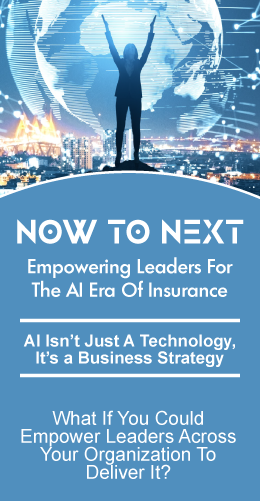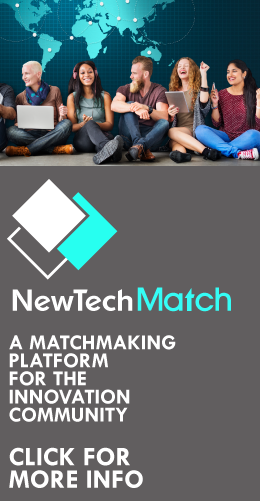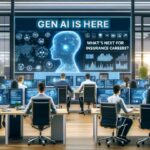
Building Your Career in the AI Era of Insurance Requires A New Strategy
It’s easy to get overwhelmed with all of the hype about AI and tune it out. What’s true is that none of us really know all the ways AI will impact our lives and careers and, for that matter, what to do about it. What we do know is that the changes will be profound. The more you know about what is coming, the better prepared you can be to address it. That is why developing a deeper, strategic understanding of AI is essential.
AI Is Evolving Rapidly:
As AI becomes more powerful, the boundaries between human and AI tasks will shift. You will need to anticipate these changes and skill up accordingly. The rapid evolution witnessed with generative AI is just the beginning.
Job Scopes Are Evolving:
AI will integrate and collapse boundaries between insurance value chain elements, altering job scopes and work processes. As AI drives cross-function and process integration, staying competitive in the job market requires developing a broader skill set and a deeper understanding of interconnected processes.
Management Span of Control:
AI will expand management’s span of control by integrating functions, automating routine tasks, and providing better oversight tools and team collaboration tools. Succeeding as a manager or leader will require understanding these broader functions and the tools that enable effective management of larger teams.
Strategic Knowledge:
A strategic understanding of AI is crucial to anticipate and navigate these changes effectively. This involves knowing what AI is, how it works, and how and where it is evolving. That includes understanding how to assess emerging tools and capabilities and their implications for business strategy and operations.
Understanding these changes will help you stay competitive and valuable in this transformative era. As Ginni Rometty, former CEO of IBM, said, “The ability to learn how AI works and how to use it effectively in business strategies will be a critical skill for leaders. This knowledge will be a cornerstone for future career growth and opportunities.”
Strategic Impact of AI on Insurance Companies and Customers
Changing Customer Expectations:
AI is fundamentally reshaping customer expectations in insurance. Customers now demand personalized, proactive services that protect them and faster response times. This is driven by AI’s ability to analyze vast amounts of data and provide tailored solutions. This shift means insurance companies will seek employees who can use AI and data to understand customers and drive innovation to better meet these new standards. Without them, they risk losing their competitive edge. As Business News Daily highlights, AI’s ability to customize plans and minimize human error results in customers receiving plans that better fit their needs, enhancing overall satisfaction (Business News Daily) (Insurance News | InsuranceNewsNet).
AI is Forcing A Shift in Company Missions and Strategies:
AI is changing the strategic goals of insurance companies. Innovation, efficiency, and customer-centricity are the priorities. If you understand how to help them use AI to streamline operations, reduce costs, and enhance customer satisfaction, you’ll have a competitive career edge. According to McKinsey, AI-driven innovations are transforming insurance from a static, annual renewal model to a dynamic, continuous engagement model, which demands a strategic understanding of AI from professionals to keep pace (McKinsey & Company).
Value Creation and Delivery:
AI is transforming the insurance value chain from product design to marketing, underwriting, claims processing, customer service, and fraud detection. Companies will need managers and leaders who see beyond their existing silos. Those who can use AI to integrate these processes and improve accuracy, efficiency, and speed will create more value for customers and stakeholders.
A strategic understanding of these changes and how to leverage AI to stay ahead of them is essential for anyone looking to build and protect their career in the AI era of insurance.
AI’s Impact on the Insurance Workforce
New Skill Requirements:
The rise of AI power users is transforming the workforce. According to the 2024 Work Trend Index by Microsoft and LinkedIn, most employees are not waiting for their companies to provide AI tools; they are sourcing and using these tools independently. This proactive approach has given rise to AI power users, who are reimagining business processes and saving significant time each day. These power users will become the standard by which insurers measure employee contribution as AI tools become as common as office productivity tools. No-code platforms will enable more employees to build their own AI-driven solutions, further democratizing AI capabilities within organizations (Source).
Role Transformations:
AI will increasingly take over mundane and repetitive tasks, freeing professionals to focus on higher-value activities. This shift will require professionals to adapt by developing new skills and embracing more strategic and innovative roles. Companies will seek employees who can leverage AI to enhance their work, drive innovation, and provide value beyond routine operations. Leaders who encourage AI adoption and provide tailored AI training for specific roles will create more efficient, engaged, and competitive teams. Managers and Leaders with these AI skills will not only meet the new demands but will also drive the innovation needed for their companies to stay ahead.
Management Span of Control:
AI will expand management’s span of control by automating routine tasks and providing better oversight and collaboration tools. Managers will need to understand how to use these tools to handle larger teams more effectively. This shift requires a strategic understanding of AI, as leaders will need to evaluate and implement AI tools that can enhance their management capabilities.
Scope of Jobs:
AI will integrate or collapse boundaries between value chain elements, altering job scopes and the work processes required to support higher-level functions. Professionals must be prepared to adapt to these changes and develop the skills needed to thrive in this new environment. Understanding how AI can streamline and optimize these processes will be crucial for career growth and job security.
Why Deeper AI Insights Are Crucial for Career Growth
Future-Proofing Careers:
Understanding AI is essential for staying relevant and competitive in the job market. As AI becomes more integrated into business operations, professionals who can harness its power will be in high demand. Continuous learning and adaptation are critical to maintaining and enhancing your career prospects (McKinsey & Company).
Strategic Evaluation of AI:
Evaluating a company’s AI strategy is crucial to identifying the organizations that are likely to succeed in the AI era. Understanding AI at the strategic level will enable you to assess how well a company is leveraging AI. This insight can help you make informed career choices and align yourself with forward-thinking organizations (McKinsey & Company) (Source).
Continuous Learning:
The rapid pace of AI development means that continuous learning is essential. Staying updated with the latest AI advancements and understanding their implications will help you remain competitive and valuable in your organization. Building a habit of regular learning will ensure you keep pace with the evolving AI landscape.
Career Benefits of AI Knowledge
Efficiency and Decision-Making:
AI tools can significantly improve efficiency and decision-making in daily tasks. Strategic knowledge of AI is what insurance careers will be built on.
Invest In Understanding AI More Deeply.
Embracing a strategic understanding of AI is not just about keeping up with technological advancements; it’s about securing your future in the insurance industry. By understanding AI’s strategic impact, evaluating your company’s and or a potential new employer’s AI strategy, and continuously learning, you can protect and build a powerful career advantage amidst the rapid changes AI will bring.
Get Started with Now To Next Mini-Lessons:
To help you begin this journey, we’re offering a series of mini-lessons from our Now To Next AI Leadership course. These 20- —to 30-minute on-demand, self-paced lessons are available at no charge and are designed to help you build the strategic understanding you need. Set aside time for one to two lessons a week to get started.
If you are just starting to build a deeper understanding of AI, how it works, how it’s evolving, and what its impact will be, our mini-lesson, “Understanding Chat GPT & Emerging AI Technologies,” is a great place to start. It’s part of the first lesson in the Now To Next Leadership course. You can check it out here.
Love to get your thoughts and answer any questions.
Regards,
Mike Connor
Linkedin









